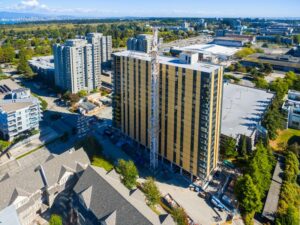By Laura Bohnert
Trudeau has stirred up a bit more controversy of late following the federal government’s approval of the Pacific NorthWest LNG project.
The Pacific NorthWest liquefied natural gas, or LNG project, proposes the construction and operation of a liquefied natural gas facility and marine terminal near Prince Rupert, British Columbia, within the District of Port Edward. The project would convert natural gas to LNG in an LNG facility on Lelu Island. The LNG would then be exported to the Pacific Rim markets in Asia.
Estimated to be worth $11 billion, and expected to be one of the largest resource development projects in Canada, the LNG project is being met with a lot of enthusiasm, especially as it is expected to provide a significant economic breakthrough in the wake of Alberta’s—and Canada’s—current oil-related economic recession.
However, not everyone is looking at the project in terms of its potential benefits.
For Canada’s Indigenous peoples, the project’s approval—despite its 190 legally binding conditions that are supposed to be taking environmental and Indigenous rights concerns into account—means something else.
It means the breach of campaign promises that assured a focus on renewing nation-to-nation relationships with Canada’s Indigenous peoples, and the fact that the federal government is defending the projects approval by citing that its groundwork was laid by the previous Harper government merely confirms suspicions that the shift in leaders evinced no change in either government processes or the underlying agenda that has caused so much harm in the past.
However, while the issue is being managed (and potentially perpetuated by the government), it may not be a mere governmental problem in itself. The issue focuses instead on an economic system that has been structured so heavily on the oil and gas industry that oil and gas projects like the LNG project need to move forward in order to get the economy moving again. Canada’s entire economic structure sits at a crisis point between economic production and the health of the environment—a health that also encompasses the human rights of Canada’s Indigenous peoples.
In a sense, Trudeau is stuck navigating the best possible outcome of a situation that can have no winners. The economic boost is necessary, but it also threatens a resurgence of growth in an unstable sector that is inevitably going to experience the exact same bust in the future. But all negatives aside (even the ones that apply to the rights, lives, and livelihoods of human beings, apparently), the project’s approval was inevitable. Canada has been stuck in a recession far too long to pass up an opportunity for economic growth that could create a trickle-down boost for each of its economic sectors, from the oil and gas industry to manufacturing, and even influencing the entertainment industry.
The only real hope we have is that the 190 conditions will actually protect the Indigenous peoples—as well as the environmental health and well-being of all of Canada’s peoples, wildlife, agriculture, and ecology—and that, once the economy gets moving again, our industries will have learned enough from this past recession to really start focusing on diversification into new, promising, and healthy innovations, like green energy, for a start.







More Stories
Rising tariffs, skyrocketing duties and an Albertan forestry industry in need of support at home